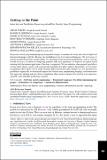Getting to the point: index sets and parallelism-preserving autodiff for pointful array programming
Author(s)
Paszke, Adam; Johnson, Daniel D; Duvenaud, David; Vytiniotis, Dimitrios; Radul, Alexey; Johnson, Matthew J; Ragan-Kelley, Jonathan; Maclaurin, Dougal; ... Show more Show less
DownloadPublished version (476.9Kb)
Publisher with Creative Commons License
Publisher with Creative Commons License
Creative Commons Attribution
Terms of use
Metadata
Show full item recordAbstract
<jats:p>We present a novel programming language design that attempts to combine the clarity and safety of high-level functional languages with the efficiency and parallelism of low-level numerical languages. We treat arrays as eagerly-memoized functions on typed index sets, allowing abstract function manipulations, such as currying, to work on arrays. In contrast to composing primitive bulk-array operations, we argue for an explicit nested indexing style that mirrors application of functions to arguments. We also introduce a fine-grained typed effects system which affords concise and automatically-parallelized in-place updates. Specifically, an associative accumulation effect allows reverse-mode automatic differentiation of in-place updates in a way that preserves parallelism. Empirically, we benchmark against the Futhark array programming language, and demonstrate that aggressive inlining and type-driven compilation allows array programs to be written in an expressive, "pointful" style with little performance penalty.</jats:p>
Date issued
2021Department
Massachusetts Institute of Technology. Department of Electrical Engineering and Computer Science; Massachusetts Institute of Technology. Computer Science and Artificial Intelligence LaboratoryJournal
Proceedings of the ACM on Programming Languages
Publisher
Association for Computing Machinery (ACM)
Citation
Paszke, Adam, Johnson, Daniel D, Duvenaud, David, Vytiniotis, Dimitrios, Radul, Alexey et al. 2021. "Getting to the point: index sets and parallelism-preserving autodiff for pointful array programming." Proceedings of the ACM on Programming Languages, 5 (ICFP).
Version: Final published version